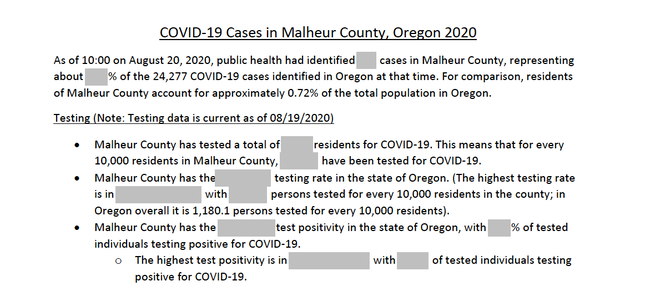
This is an excerpt of a Covid study done in Malheur County by the Oregon Health Authority that covers up what in some instances is already publicly disclosed. (Oregon Health Authority document)
Confusion and suspicion are well stocked in the public relating to government information about the pandemic, and that doesn’t help Oregonians.
Oregon has done better than most states in keeping Covid relatively under control. Infection rates and the rate of those dying from the virus are lower here.
But that doesn’t mean Covid doesn’t remain a serious threat to public health. Hundreds of Oregonians still test positive on a daily basis, showing up infected with a virus that can kill them.
Particularly now with President Donald Trump’s own infection, the need for absolute transparency from government is vital. That’s not what we’re always getting, and it’s unclear why.
In Oregon, the numbers about Covid flow from the Oregon Health Authority. Since the pandemic came to the state earlier this year, the agency has gradually expanded its disclosures. The Malheur County Health Department too has dramatically improved the quality of information posted daily for residents to evaluate on their own.
There remain gaps, though.
Recently, the Enterprise requested a copy of an epidemiological study conducted by the Oregon Health Authority. This report assessed the virus in Malheur County. Its findings were intended to guide state and local officials on how to get the county’s rampant infection rate under control.
The state released the study – but shot through with holes. The document had virtually every number redacted, kept secret from the public.
Since early this year, health authorities have cited state law to justify keeping some details about the pandemic from the public. The Oregon Health Authority did so again when it released the Malheur County study.
The law they use as a shield provides that information gathered by government employees “in the course of an investigation of a reportable disease or disease outbreak is confidential.” (That’s ORS 433.008 if you’re curious.)
The intent appears to be to guard against disclosing highly personal information about individuals. That’s sensible. No media organization in Oregon that I know of has sought to pry into such medical information.
But the health authority also can decide what to keep confidential and what to disclose. That’s why, despite the seeming requirement for confidentiality, the state agency daily reports in great detail on the course of the “disease outbreak” we’re experiencing with Covid.
But in releasing the Malheur County study, the state agency blacked out a lot of numbers. Many of those were already public. The state agency, for example, blanked out in this document the total cases in Malheur County – while putting that number out publicly elsewhere.
Trying to keep secret a number that’s already public doesn’t make sense. You have to wonder why.
And then the agency decided to keep secret the number and percentage of cases in Malheur County affecting Hispanics.
Jonathan Modie, lead communications officer for the Oregon Health Authority, explained that in an email to the Enterprise.
“There is some risk of inadvertently breaching confidentiality if the population on which the data is based is small,” he wrote. “If only a small number of individuals in a county are of a certain race or ethnicity, it may be possible for others to identify individuals in these race and ethnicity categories if they’re affected by the virus.”
He said the policy has to be the same for every county, meaning that the worry about identifying individuals is more acute in counties that have, say, a small Latino population.
This isn’t sensible. Malheur County’s population is 30% or so Latino, representing a major segment of our local population. Statewide data shows the Latino population has been hit harder than just about any other ethnicity and that’s no doubt true in Malheur County.
Knowing that with certainty instead of guessing could affect how the community responds to the spreading virus.
The state seems to believe that some armchair detective out there going to pore over government data to try to finger individuals in Malheur County or elsewhere who are infected. To what purpose? To go put a red X on their door? While there is reasoned concern in general over discrimination against Latinos in Malheur County and elsewhere, hiding the truth about their exposure to the virus seems too paternalistic.
The law seems to provide a way for the government to disclose such information. The circumstance under law providing for confidential disease investigations also notes that “nothing” in the law “prevents the authority…from publishing statistical compilations and reports…if the compilations and reports do not identify individual cases.”
I’ll leave it to lawyers to argue the technical details, but the intention seems to be that the public can have information about infections as long as no individual’s details are trotted out.
Pursuing understanding, I posed a question for Pat Allen, director of the Oregon Health Authority: “What scientific evidence does OHA rely on to conclude that the public can’t be trusted with the information redacted in this form?”
So far, no answer.
This is all baffling. Government officials have struggled to impress upon people the dangers of Covid. They have cited statistics about Covid to explain why schools can’t open and big indoor weddings are a no-no. The credibility of that information is under constant challenge in some quarters in our community and across the state.
Keeping information secret without clear reason doesn’t help make the case the government should be trusted.
At the Enterprise, we’re not trying to pry open medical histories of any particular person infected with Covid. Rather, we’re trying to do our jobs of examining the government’s conduct and providing the community the best information possible to combat the pandemic.
When government officials too readily get out the Redact-o-Matic to keep the public away from the full truth, that’s not appropriate. The government no doubt will continue to claim the law requires officials to muzzle themselves. For the sake of the public well-being, Oregon legislators need to revise that law when they gather in 2021.
Les Zaitz is editor and publisher of the Enterprise. Reach him by email at [email protected].
YOU CAN HELP KEEP LOCAL NEWS FLOWING: Reader support allows the Enterprise to provide in-depth, accurate reporting that otherwise would not get done. Keeping the community well informed is essential. SUBSCRIBE – $5 a month, automatically. DONATE – to provide additional support.




